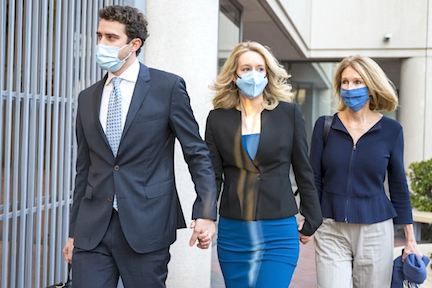
Elizabeth Holmes ended her last day on the witness stand today by talking about her vision for Theranos and rejecting claims that she misled anyone.
Closing arguments are scheduled for Dec. 16 in U.S. District Court in San Jose, and then the jury will decide Holmes’ fate.
Holmes, founder and CEO of the Palo Alto-based company, is charged with defrauding investors, doctors and patients about the company’s blood-testing technology. If convicted, she faces up to 20 years in prison and $2.75 million in fines.
Responding to questions from her counsel Kevin Downey, Holmes testified that, in pitching Theranos to investors, she “wanted to convey the impact” the company could have and “how it could change health care” through its fingerstick blood-testing method.
Investors, she said, were interested in “what was possible” in the future.
Asked if she ever tried to mislead investors, Holmes said, “Never.”
Asked if the fact that investors lost money was due to her misleading them, Holmes responded, “Of course not.”
Did she at any time lead patients to believe that Theranos could offer accurate test services while knowing it couldn’t? Downey asked. “Of course not,” Holmes said again.
Earlier in the examination, Downey focused on Holmes’ relationship with her business and romantic partner, Sunny Balwani.
Balwani, Holmes testified, would “vent” about problems at Theranos and criticize her and others for their performance. In one series of texts, Balwani said that he found the research and development program so “maddening” that he would “take over,” even though Holmes had been overseeing the work.
Downey showed Holmes another text in which Balwani described the Theranos clinical lab as “a mess.” Holmes responded “I could not agree more.”
Holmes testified that in answering Balwani’s texts she tried to “not ignite him with her response.” Agreeing with him, Holmes said, was one way to show that she was “listening” and “paying attention.”
Despite having a board of former generals and other luminaries, Holmes testified that Balwani was her most important advisor.
Breakup with Balwani
Holmes testified earlier in the trial that the relationship ended when she asked Balwani to leave the company and moved herself out of a $9 million house the couple had bought in Atherton.
Today, she said that the breakup was “a process,” not “a single moment,” adding that after the move she sometimes saw Balwani at church or when running on a trail near the Stanford Dish.
Holmes said that she did not receive any money from the sale of the Atherton house and had “no idea when it was sold.”
Customer feedback
The defense also chalked up two small victories in its long-running effort to introduce positive feedback from customers who had their blood drawn at Theranos sites inside Walgreens.
U.S. District Judge Edward Davila has repeatedly denied motions to get such evidence in, agreeing with the prosecution that customer feedback praising Theranos’ convenience or low test prices was irrelevant to the question of whether Holmes misled doctors and patients about the accuracy of the tests.
The judge has also questioned whether Holmes even saw any of the feedback.
Today, Downey got Holmes to confirm that she received a “Theranos Experience Survey” from Walgreens, then briefly put up on the courtroom monitors a summary page showing that the average customer rating of the Theranos experience for the previous month was 4.75 out of 5 stars.
Downey later persuaded the judge that it was “not fair” to have allowed the government to put on a witness earlier in the case to testify about her inaccurate HIV results — results that Downey said Holmes “knew nothing about” — while excluding other documents attesting to accurate results that Holmes did in fact see.
The judge agreed to let in a single email from a physician saying that the Theranos lab results were “congruent” with results from other labs.
But he instructed the jury to consider the email only as it might affect Holmes’s state of mind, a common limiting instruction meaning that the jury can only consider whether the positive feedback helps show that Holmes actually believed that the technology was providing reliable test results, not that the results were in fact accurate.
With that, the defense rested.
The move surprised some observers, who had anticipated that the defense would call a mental health expert to testify that emotional and physical abuse that Holmes said she suffered at the hands of Balwani and as the result of a rape during her time at Stanford created a “mental defect” that should relieve her of any responsibility for her actions.
The prosecution told the court that it would bring a motion to strike the testimony about abuse given the lack of expert support.
Davila then sent jurors home for another long break while he and the lawyers hash out jury instructions. The jury will return to hear closing arguments on Dec. 16. — Bay City News
